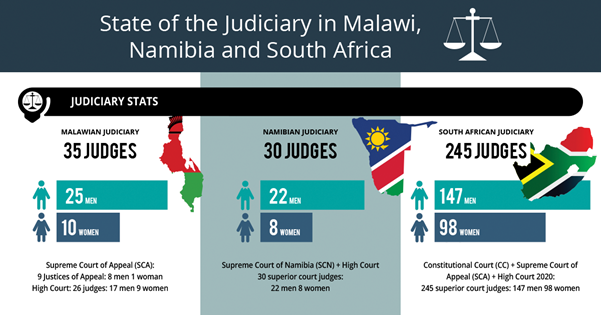State of the Judiciary
In this multi-country study, my colleagues and I from the Democratic Governance and Rights Unit (DGRU) analyze the key issues of independence, efficiency and operations, and accountability in three southern African judiciaries – Malawi, Namibia and South Africa.
Thanks to the generous support of the Norwegian Embassy, and in collaboration with IPOR (Malawi), Survey Warehouse (Namibia), and Citizen Surveys (South Africa), we are proud to release this comprehensive report on the state of the judiciary in the High Courts in these three countries.
Initiated on the understanding that the well-being of the judiciary is essential to the functioning of a modern state and the well-being of its citizens, the report’s key output is to highlight both court users’ and judges’ perceptions of judges and the judiciary, across Malawi, Namibia, and South Africa, how they are treated by stakeholders, and what biases are experienced. The main report builds on three citizen surveys, as well as more than 50 interviews with judges across all three countries.
Some of the highlights of our research are displayed in the infographics and video below.





If you are interested in finding out more, please feel free to check out the summary main report, the full report, as well as the gender and Covid-19 special reports.
Magistrates Matter
Together with other members of the Democratic Governance and Rights Unit (UCT) and Magistrates Matter, I recently completed several research reports about the state of the magistracy in South Africa. This video summarizes several of our policy recommendations that are based on this research. For more information on the advocacy work, please visit the Magistrates Matter website. The individual reports about internal accountability, magistrates and their work environment, as well as the results of the court user survey can be found below.

Analysis
Peer Reviewed | Working Papers | Reports | Work in Progress
THE 2019 SURVEY OF SOUTH AFRICAN MAGISTRATES’ PERCEPTIONS OF THEIR WORK ENVIRONMENT
with Vanja Karth, Chris Oxtoby, Alison Tilley, Zikhona Ndlebe and Mbekezeli Benjamin | DGRU Working Paper PDF
We surveyed 165 South African Magistrates about their work environment and we identify six key areas where we recommend policy reform and further research: workload and qualifications, stress, safety and security, infrastructure, remuneration, and corruption.
AN ANALYSIS OF MISCONDUCT PROCEEDINGS AGAINST MAGISTRATES IN SOUTH AFRICA
with Vanja Karth, Chris Oxtoby, Alison Tilley, Zikhona Ndlebe and Mbekezeli Benjamin | DGRU Working Paper PDF
We compare the formal disciplinary process to the empirical records from the Magistrates Commission (2015-2018) and Parliament (2001-2018). Whilst a majority of cases were resolved within a year of the complaint being filed, we identified several factors which can contribute to serious delays in the process (e.g. interlocutory applications, applications for postponement, bringing proceedings on judicial review, and delays in the process once matters are being considered by Parliament).
SOUTH AFRICAN MAGISTRATES’ COURT USER SURVEY
with Vanja Karth, Chris Oxtoby, Alison Tilley, Zikhona Ndlebe and Mbekezeli Benjamin | DGRU Working Paper PDF
Although we were unable to execute the initially designed face-to-face survey with lawyers and ordinary citizens, the results still provide valuable insights on two levels. First, while the results of the survey are not representative, they can be used to guide future research of court users in South Africa and other similar contexts. Second, we share how we surveyed a difficult to survey part of the population – court users – during a time of limited accessibility (due to Covid-19 related lock-down measures).
BOUNDED AUTONOMY: WHAT LIMITS ZIMBABWEANS’ TRUST IN THEIR COURTS AND ELECTORAL COMMISSION?
Afrobarometer Policy Paper No. 52 PDF
The analysis of public opinion data suggests that citizens trust courts and the Zimbabwean Electoral Commission (ZEC) within bounds. For court cases involving only ordinary citizens and technical electoral issues such as the roll-out of the biometric voter registration, the judiciary and the ZEC enjoy substantial public confidence. But faced with politically sensitive issues, they no longer find broad popular support.

Data
Formal Rules | Behavioural Data
Image: Shyamal
Constitutional powers of african apex courts
This data set is building on the information collected by Stroh & Heyl (2015). The data set maps five different dimensions of apex courts: Access, Powers, Ex Ante Constraints, Ex Post Constraints, and Reach. We use their coding scheme and extend the 9 country sample of West African countries to include an additional 10 African countries. The 19 countries covered are: Benin, Botswana, Burkina Faso, Côte d’Ivoire, Ghana, Guinea, Kenya, Mauritania, Malawi, Mali, Namibia, Niger, Nigeria, Senegal, South Africa, Tanzania, Togo, Uganda and Zimbabwe.
Judges & Magistrates
In 2019, we conducted an online survey of Magistrates in South Africa exploring how magistrates experience their daily work environment. We are building on these results and update the questionnaire to interview High Court judges in Malawi, Namibia, and South Africa about issues such as work load, opportunities for career progression, corruption, safety, institutional support, and judicial independence).
Citizens & Court Users
Building on the 2020 South African Magistrate Court User Survey, we are developing a court user survey for High Court users. It is designed to provide new insights in how lawyers and ordinary citizens in Malawi, Namibia and South Africa experience High Courts focusing on issues such as access to courts, court procedures, and corruption.
Steering Committee
The project is a collaboration between is a collaboration between the Democratic Governance and Rights Unit (DGRU) and the Institute for Democracy, Citizenship and Public Policy in Africa (IDCPPA), and hosted at the DGRU at the University of Cape Town. The project is being developed by:
Vanja Karth,University of Cape Town
Chris Oxtoby, University of Cape Town
Matthias Krönke, University of Cape Town